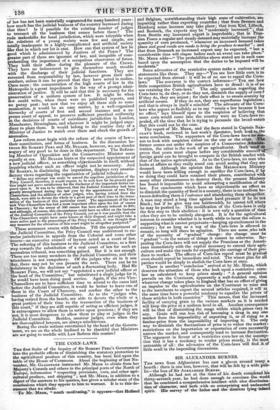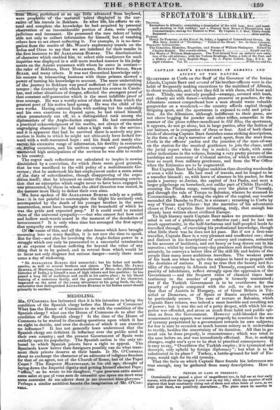SIR ALEXANDER BURNES.
TRH news from Afghanistan has cast a gloom around many a hearth : there is one loss, however, that will be felt by a wide pub- lic—the loss of Sir ALEXANDER BURNES.
Although he had not at the time of his death completed his thirty-seventh year, he had done enough to convince the world that he combined a comprehensive intellect with nice discrimina- tion of character, and both with an enterprising and undaunted spirit. His survey of the Indus and the districts lying inland from linooj, p-effolmed at an age little adiEtneed-from boyhood, were prophetic of the matured talent displayed in the nar- rative of his travels in Bokhara. In after life, his efforts to ex- tend and complete the knowledge he had acquired by personal observation of no inconsiderable portion of Asia, were equally judicious and incessant. He possessed the rare talent of being able not only to collect information for himself, but of teaching others how to set about collecting it For example, it is no dero- gation from the merits of Mr. Woon's exploratory travels on the Indus and Oxus to say that we are indebted for their results in the first instance to Sir ALEXANDER BURNES. The discrimination of character which enabled him to select able coadjutors for such inquiries was displayed in a still more marked manner in his judg- ments on the Asiatic statesmen with whom he came in contact— the ruler of Bokhara, DOST MOHAMMED, RUNJEET SINGH, SHAH SUJAH, and many others. It was not theoretical knowledge only : his success in transacting business with those princes showed a power of turning his knowledge to account. The mere undertaking of the journey to Bokhara was proof sufficient of his enttrprising temper : the dexterity with which he steered his course in Canda- liar, and other situations of danger, afforded the strongest proof of that constant self-possession which is the most infallible proof of true courage. He was a worthy scion of that stock from which the greatest poet of his native land sprang. He was the child of his own works. Having entered India with nothing but his cadetship and his own exertions to depend upon, he had raised himself, when prematurely cut off, to a distinguished rank among the diplomatists of the Anglo-Indian empire. He had commanded a practical acknowledgment of his merits, not always of the most ungrudging character : he had taken a high rank in the service ; and it is apparent that had he survived there is scarcely any pro- motion in India to which he might not ultimately have looked for- ward with a well-warranted hope : and his frank and manly cha- ractwhis extensive range of information, his fertility in resources ,ontjrying occasions, and his uniform courage and promptitude, 'Warranted high anticipations of the services he was able to render to his country.
The regret such reflections are calculated to inspire is nowise diminished by a conviction, for which there seem good grounds, that he was sacrificed to the wild policy of a melodramatic Go- vernor; that he undertook his last employment under a stern sense of the duty of subordination, though disapproving of the expe- dition itself; that he laboured on under the disheartening convic- tion that an enterprise which ought never to have been engaged in was prosecuted, by those in whom the chief direction was vested, in the manner most likely to defeat their own aims.
We have spoken of Sir ALEXANDER BURNES solely as a public loss : it is too painful to contemplate the blight his untimely end, accompanied by the death of his younger brother in the same insurrection, must have brought upon the household of which he was the pride and expected prop.* If it could avail to remind them of the universal sympathy—but who cannot feel how cold and hollow such-words sound in the moment of the desolation of bereavement ? It is only when time has assuaged the first agony that sympathy can console. Of tile cause of this, and all the other losses which have brought mourning into so many families, it is not now the time to speak. But for that—and also for involving the Anglo-Indian power in a struggle which can only be prosecuted to a successful termination at an expense of human suffering far beyond the value of any thing that is to be gained, and to retreat from which would be to incur not only disgrace but serious danger—surely there must come a day of reckoning.
• Sir ALEXANDER Bonarra died unmarried ; but his father and mother survive, as well as several brothers and sisters. The father, Mr. JAMES BURNES, of Montrose, (townsman and schoolfellow of Mira, the philosophical historian of India,) is himself a man of high talents and fine qualities : he has passed a long life of usefulness and credit in his native place : to his liberal training of a numerous family, and the generous ardour of' his character, impressed on the mind of the young adventurer at his going forth, the cha- racteristics that distinguished ALEXANDER BURNES in his Indian career should primarily be ascribed.



























 Previous page
Previous page